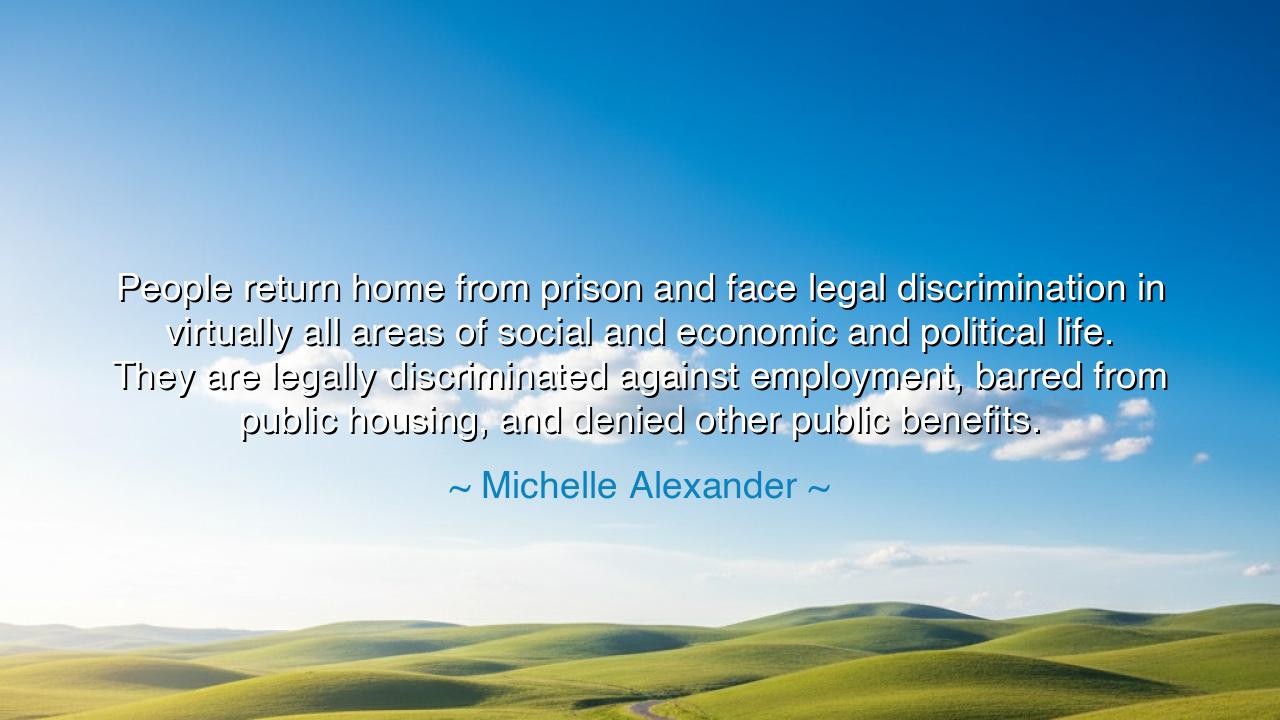
People return home from prison and face legal discrimination in
People return home from prison and face legal discrimination in virtually all areas of social and economic and political life. They are legally discriminated against employment, barred from public housing, and denied other public benefits.






"People return home from prison and face legal discrimination in virtually all areas of social and economic and political life. They are legally discriminated against employment, barred from public housing, and denied other public benefits." Thus spoke Michelle Alexander, author of The New Jim Crow, unveiling the hidden chains that remain clasped upon men and women long after the prison gates have opened. Her words cry out against a system that claims to restore freedom, yet binds the returning citizen with invisible walls of legal discrimination. In her vision, the punishment does not end with the sentence—it lingers, it festers, it haunts.
The origin of this wisdom lies in the long shadow of America’s history of racial and social control. When Alexander speaks of legal discrimination, she draws a line from the days of slavery, through the era of Jim Crow segregation, into the modern age of mass incarceration. In each era, the law itself has been twisted into a tool of exclusion. What appears as justice becomes another mask of oppression. A person may serve their time, yet society ensures they are never truly free—denied jobs, shelter, and the means to rebuild their lives.
History provides us with a bitter example. After the Civil War, Black Americans were promised freedom, yet states quickly enacted "Black Codes" and later Jim Crow laws that barred them from property, education, and fair wages. These codes were written into law, legitimized as “legal,” but in truth, they were systems of social death. Alexander shows us that today’s laws—barring the formerly incarcerated from housing, employment, and benefits—operate in the same spirit. They may not speak openly of race or caste, but their impact falls heavily upon the same communities that have always borne the weight of exclusion.
Consider the man who walks out of prison after years of confinement, determined to begin again. He seeks work, but every application brands him with a question about felony convictions. He seeks a home, but public housing closes its doors against him. He seeks support, but food stamps, student aid, and voting rights are often denied. Though the prison walls no longer surround him, society has built new barriers through law, ensuring that he remains on the margins. His so-called freedom is a fragile illusion.
There is a deep irony in Alexander’s words: what is called justice perpetuates injustice. The state claims safety and order, yet its policies sow despair and instability. By denying returning citizens the chance to work, live, and vote, it drives them back toward the very cycles of crime and poverty it claims to prevent. Thus, the law becomes both the jailer and the trap, ensuring that those who stumble once may never rise again. Her statement is not only lament but also a warning—that a society which treats its returning people as outcasts plants seeds of division that will one day choke its own prosperity.
The lesson is clear: justice is not complete when punishment ends; it is only complete when restoration begins. A society that denies returning citizens the means to rebuild their lives denies itself peace and wholeness. If the law is written to exclude, then the law must be rewritten to restore. If systems exist to bar opportunity, then new systems must be forged to open doors. For true justice is not about breaking men down—it is about raising them up again as full members of the human family.
What practical steps must we take? Support ban-the-box laws that prevent employers from rejecting applicants outright for past convictions. Advocate for housing policies that welcome, rather than exclude, those returning from prison. Demand the restoration of voting rights, for citizenship without voice is a hollow gift. And above all, cultivate a spirit of compassion, remembering that every man and woman who has stumbled deserves a chance to rise.
So let Michelle Alexander’s words echo like a solemn truth: freedom without opportunity is not freedom at all. A society that chains its citizens through laws of exclusion betrays its own ideals. But a society that chooses mercy, restoration, and inclusion will discover that justice, when tempered with compassion, is not only fairer but stronger. For in lifting the fallen, we raise the whole.






AAdministratorAdministrator
Welcome, honored guests. Please leave a comment, we will respond soon